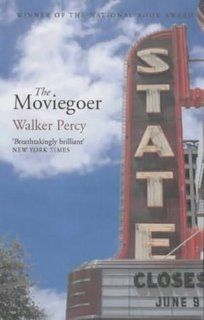 The Moviegoer, by Walker Percy, is as understated a philosophical novel as I have read. This 1962 National Book Award winner is set in New Orleans during the days leading up to Carnival. The characters we come across are largely high-society types who have been educated at elite northeast institutes of higher learning and now seem to be overly interested in what krewe they belong to. But the protagonist, Binx Bolling, who himself belongs to a well-to-do Louisiana family, seems out of place in this world. In fact, he seems to have one foot outside of whatever circle he is in.
The Moviegoer, by Walker Percy, is as understated a philosophical novel as I have read. This 1962 National Book Award winner is set in New Orleans during the days leading up to Carnival. The characters we come across are largely high-society types who have been educated at elite northeast institutes of higher learning and now seem to be overly interested in what krewe they belong to. But the protagonist, Binx Bolling, who himself belongs to a well-to-do Louisiana family, seems out of place in this world. In fact, he seems to have one foot outside of whatever circle he is in.Wounded in the Korean War, Bolling has returned to his native south and begun a rather uninspired, yet successful, career as a stockbroker. He is pestered by the notion that his family is disappointed he has not become a doctor and he is preoccupied by his endless “search.” Just what it is he is searching for, I suppose, is the driving force of the novel. Bolling is on this undefined “search,” afraid of malaise wherever it may exist and intrigued by the concept of repetition:
A successful repetition. What is a repetition? A repetition is the re-enactment of past experience toward the end of isolating the time segment which has lapsed in order that it, the lapsed time, can be savored of itself and without the usual adulteration of events that clog tim like peanuts in brittle. . . . How, then, tasted my own fourteen years since The Oxbow Incident? As usual it eluded me. There was this: a mockery about the old seats, their plywood split, their bottoms slashed, but enduring nevertheless as if they had waited to see what I had done with my fourteen years. There was this also: a secret sense of wonder about the enduring, about all the nights, the rainy summer nights at twelve and one and two o’clock when the seats endured alone in the empty theater. The enduring is something which must be accounted for. One cannot simply shrug it off.Walker Percy, I have since learned, shared his interest in repetition with Danish philosopher Kierkegaard. Though Kierkegaard is never mentioned by name, in the novel’s epilogue Bolling informs us, “As for my search, I have not the inclination to say much on the subject. For one thing, I have not the authority, as the great Danish philosopher declared, to speak of such matters in any way other than the edifying.”
The writing is crisp and the abundant descriptive passages are elegant without being unnecessarily decorative. No wasted words. Not one. Throughout the book my mouth was quite literally agape at the ease with which Percy was able to relate even the most minute details so precisely. In fact, the description of Bolling's family members was one of the most enjoyable aspects of the book. I had a fun time with this one. There is much humor to be found in these pages even though the protagonist meanders through a listless existence and the central female character, Bolling's cousin-by-marriage with whom he is in love, is riddled by mental illness.
The title of this book is a meaty topic that one could invest a lot of time in analyzing. On the surface we see, yes, Bolling frequents picture shows, he has a propensity to describe others in terms of their resemblance to film stars and on occasion he even relates events in his life to those in movies. But far more subtly, and likely of more significance to the author, is that he is divorced from life almost as though he were watching it on the big screen. Bolling is an adept voyeur and Percy supplies his protagonist was ample opportunity to show off his keen eye for the peculiarities of people and places with the generous descriptive passages I mentioned above. If only he had the ability to self-critique half as well, a sentiment his aunt echoes when she lays into with the following assessment:
First, is it not true that in all of past history people who found themselves in difficult situations behaved in certain familiar ways, well or badly, courageously or cowardly, with distinction or mediocrity, with honor or dishonor. They are recognizable. They display courage, pity, fear, embarrassment, joy, sorrow, and so on. Such anyhow has been the funded experience of the race for two or three thousand years, has it not? Your discovery, as best I can determine, is that there is an alternative which no one has hit upon. It is that one finding oneself in one of life’s critical situations need not after all respond in one of the traditional ways. No. One may simply default. Pass. Do as one pleases, shrug, turn on one’s heel and leave. Exit. Why after all need one act humanly? Like all great discoveries, it is breathtakingly simple.I'll stop now. In case the length of my entry does not make it clear, this is as fine a novel as I have read in quite a while. Strong recommendation.
No comments:
Post a Comment